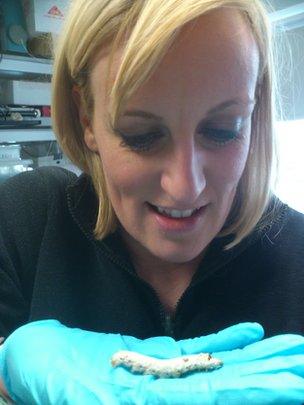How a northern town became a silk powerhouse
- Published

Silk production helped drive global trade, industrial development and social change. But it also shaped one British town that has been home to its production for four centuries.
I moved to Macclesfield in Cheshire just over 10 years ago, and it did not take long before the seemingly endless references to silk had me grinding my teeth.
From chip shops (the Silktown Fryer) to dentists (Silk Dental Care), the football team (the Silkmen) to the radio station (Silk 106.9), there seemed to be a tedious obligation to be branded with the word.
Some businesses got oh-so-clever, with one restaurant changing the I to a Y to make Sylk in order to stand out from the crowd. Genius.
Soon, though, the irritation was replaced by curiosity and then fascination as it became increasingly clear just what a profound effect the silk industry had in shaping the town. Many of the old weavers' cottages are still standing, as are a number of the 70-plus mills that once dominated the landscape.
I walk my children to school down Lyon Street, named to mark the connection to France's greatest silk centre, while other streets bear the names of the major mill owners whose influence, benign or otherwise, shaped every aspect of the lives of the thousands of people they employed.
Silk brought with it regular work, for women especially, and its presence in Macclesfield also heralded the birth of its social infrastructure, as cotton and wool did in other industrial towns.
As Prof Jeremy Black from the University of Essex said: "One of the interesting aspects of industrial society, particularly in the north of England, is the development of what we call social capital. The factories and the workforces and the owners are not simply involved in a work relationship, they're also trying to create a new environment - for example, the growth of churches and the growth in particular in education.
"By the end of the 19th Century you have great civic foundations with lots of local philanthropy, mostly from the new industrial orders. So what one has is a more purposed social capital, desired and designed to try and improve the nature of society. Whether you were on the left or the right, it ceased to be appropriate to say, 'I want things to be as they were 100 years ago.'"
Things really begin to get interesting when you pull back the lens and see just how influential silk has been across the world. Since a Chinese empress supposedly dropped a cocoon into her hot tea and started to tease out the single thread of silk that came loose, the smoothest of luxury materials has provided a status symbol for the rich and powerful.
It has also helped play midwife to the anarchist movement in its earliest days, and pushed forward technological change - from the development of arguably the world's first computer, in the shape of the Jacquard loom and the investigation into Mendelian genetics at the beginning of the 20th Century to the creation of state-of-the-art medical implants at the beginning of this one.
Packed and bundled
Silk also provides economists with the earliest model of a globalised industry, according to Debin Ma of the London School of Economics.
"There were other materials like coffee and ceramics but these came later. Silk was global early on for simple reasons, especially silk thread, because it's easily packed and bundled, and has extremely high value. In old times when transportation costs were very high and travel very dangerous, if you managed to bring a little bit of silk with you it's very profitable," he said.
And these high profits made competition fierce, with the big silk-producing nations often dependent on political disquiet elsewhere for their own well-being.
Although silk had been processed in the UK for centuries, it was only once the French revolutionaries banned silk in France that British centres like Macclesfield really had the opportunity to flourish. That is really when the town established itself as the nation's silk powerhouse, with most of the population making their living on the back of it.
When Napoleon came to power, however, he rejected the revolutionary puritanism and became a powerful patron of French silk. The resulting downturn in Macclesfield led people there to take their knowledge and skills across the Atlantic and found the American industry in Paterson, New Jersey.
The powerful expansion of silk across the globe has been in retreat for some time. Attempts at local production of the raw material, spearheaded by leaders such as James I in England, Henry IV in France and President John Quincy Adams in America, all ultimately failed. Nowadays, most production of the silk itself takes place once again in India and China, though many people there are heading to the cities and turning their backs on the hard labour involved in raising silkworms and harvesting their silk.
There are still plenty of people prepared to spend £200 for a scarf or £90 for a tie made from pure silk, and the luxury end of the market remains resilient. Back in Macclesfield, two companies continue to produce thousands of metres of finished silk products every year, and the connection with the industry that has been here for four centuries and counting helps lend the town a coherence - and for its residents, a meaningful sense of identity.
So anyone thinking of opening a bar or a bookies with the word silk in its name - go ahead. I'll be among the first through the doors. Just as long as you don't try to get too fancy and use the letter Y instead of an I. There's nothing smooth about that.
Silk will be broadcast on BBC Radio 4 on 23 October at 11.00 BST or listen again on iPlayer.